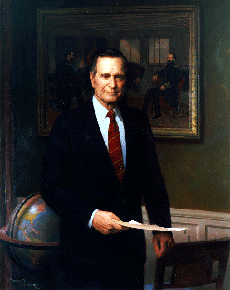|
The 43 Presidents
of the
United States of America

George Herbert Walker Bush
41st President
1989 - 1993

| Born |
June 12, 1924 |
| Birthplace |
Milton, Massachusetts |
| College |
Yale College, New Haven, Connecticut |
| Religion |
Episcopalian |
| Ancestry |
English |
| Occupation |
Businessman, Vice President,
congressman, government official |
| Political Party |
Republican |
| Represented |
Texas |
| Term |
January 20, 1989 - January
20, 1993 |
| Died |
Still Alive |
| Place of Death |
Still Alive |
| Buried |
Still Alive |
George Herbert Walker Bush was the 41st President
of the United States.
Important events during President Bush's
administration were:
-
Exxon Valdez, oil tanker, ran
aground in Prince William Sound, resulting in largest oil spill in U.S.
history on March 24, 1989.
-
Oliver L. North convicted of
shredding documents, and two other crimes but acquitted of nine other
charges dating from the Iran-contra affair on May 4, 1989.
-
Chinese troops regained control of
Beijing from pro-democracy protesters, killing hundreds of students and
workers in Tiananmen Square and restoring the primacy of the Den Xiaoping
regime, on June 3, 1989.
-
On September 21, 1989, Hurricane
Hugo struck South Carolina coast, causing extensive damage and rendering
many homeless. It was the most expensive disaster to date in the
United States, with losses estimated at 3.7 billion in South Carolina alone.
-
San Francisco and its environs
rocked by a powerful earthquake, on October 17, 1989.
-
Destruction of Berlin wall began
on November 12, 1989.
-
President met with Soviet
President Gorbachev for their first summit, on shipboard off Malta, on
December 3, 1989.
-
General Manuel Noriega
surrendered; brought by United States authorities to Florida to face trial,
on January 3, 1990.
-
Nelson Mandela, leader of the
African National Congress, freed after more than 27 years in South African
prisons, on February 11, 1990.
-
Congressional ban on smoking on
domestic fights of less than six hours went into effect, on February 26,
1990.
-
On April 7, 1990, John M.
Poindexter convicted on 5 charges of lying to and deceiving Congress in
order to conceal the Reagan Administration's part in the Iran-contra affair;
conviction was overturned in November 1991.
-
Boris N. Yeltsin elected President
of the Russian Republic, on May 29, 1990.
-
Proposed constitutional amendment to
outlaw "flag burning" supported by President, defeated in Senate,
on June 26, 1990.
-
Nelson Mandela arrived for a
10-day U.S. tour, pleading for sanctions against South Africa to remain in
place before black majority could gain political rights, on June 20, 1990.
-
Iraqi troops invaded and occupied
Kuwait. The action, condemned by the United Nations Security Council, set of
chain of events leading to the Persian Gulf War on August 2, 1990.
-
Germany reunited on October 3,
1990.
-
Margaret Thatcher resigned as
British Prime Minister, and John Major assumed the job on November 22, 1990.
-
Code-named Operation Desert Storm,
a U.S.-led multinational force launched the Persian Gulf War with air
attacks on Iraq and Iraqi-occupied Kuwait, followed by an invasion on
February 23 to sweep the Iraqis out of Kuwait; Iraq capitulated to U.N.
demands on February and U.S. military operations ceased from January
16-February 28, 1991.
-
Iraq accepted U.N. terms for
cease-fire, formally concluding Persian Gulf War; endangered Kurds attempted
to flee; no-fly zones established to protect Kurds in north and Shiites in
South on April 6, 1991.
George Herbert Walker Bush was:
-
the first incumbent Vice
President to be elected President since Martin Van Buren in 1835
-
the first President to have
been chairman of his political party
-
the first President to have
been Ambassador to the United Nations
-
the first President to have severed
as director of the Central Intelligence Agency
|